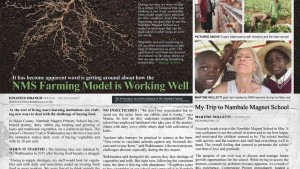

 |
It has become apparent that the word is getting around and the Nambale Magnet School model is working well!
During our stay we were visited by a school in Tanzania that was looking to see if our sustainable farm model might have potential for their situation. At the very beginning of the partnership between WIKS Kenya, NMS, and Nambale Cornerstone Project, our goal was to use the Nambale Magnet School as a model or prototype that can be duplicated in other areas all over the world
Shareable and self-sustaining to lift up other communities to take care of themselves as well. The unsolicited visit from the director of a school so far away shows us that we are spreading something worthwhile.
The following is an article by Ignatius Odango, published August 4th, 2018 in the Standard Digital
As the cost of living soars learning institutions are crafting new ways to deal with the challenge of buying food.
In Busia County, Nambale Magnet Primary School has embraced poultry, dairy, rabbit, pig keeping and growing of kales and traditional vegetables, on a commercial basis. The school's Director Evalyn Wakhusama says the move has seen the institution reduce daily costs of buying vegetables and milk by 20 per cent.
The farming idea was initiated by Ms Wakhusama in 2015 after buying food became a struggle.
“Owing to supply shortages, my staff would look for vegetables and milk daily and sometimes ended up missing fresh food in most markets. We were forced to think outside the box,” said Ms Wakhusama.
To start off, the school acquired six acres of land and put one and half acres under agriculture.
The school has moved from spending more than Sh20,000 on sukuma wiki a month to Sh4,000, a 20 per cent reduction in costs. Creative solutions have also been embraced to increase yields.
Michael Matete is in charge of the rabbit project and says the urine collected from 20 rabbits is stored for 28 days in a closed tank to prevent it from getting mixed with rain water. The liquid waste is then mixed with water to a ratio of 1:1 per litre and sprayed on the kales to keep them ever green and healthy.
“We don’t buy insecticides but instead use the urine from our rabbits and it works,” says Matete.
So how do they undertake responsibilities?
The school has employed farmhand who take care of the poultry, others with dairy cows while others deal with cultivation of kales.
Teachers take learners for practical in science at the farm. “Vets come to vaccinate animals against any livestock disease and we pay them,” said Wakhusama.
Like most projects, challenges abound, especially during the dry season.
Wakhusama said during the dry season, they face shortage of vegetables and milk. But right now, following the consistent rains, the farm is flowing with abundance.
“Neighbors come to buy vegetables in our school and some sell it in Nambale town. We are saving up the profits which will be used to expand the project,” she said.
Traders flock the school to buy eggs and retail them in shops and stalls in Nambale and Busia towns. Nambale Magnet plays host for neighboring secondary and primary schools to learn what it takes to rear poultry, dairy cows, rabbits and pigs.
The piglets are sold to neighbors. The school is guaranteed of 50 liters of milk daily from the available nine Friesian and 12 Ayrshire dairy cows, enough to sustain the population of 500 students, teaching and non teaching staff.
When the school is closed they take milk to Nambale Dairy and this fetches extra cash. Initially, according to school director, they spent Sh2,400 on buying milk.
The school has already acquired another piece of land to plant maize. Locals are now amused how the school has transformed land that looked valueless into a land of abundance. The area was a swamp.
“Nobody would have imagined that the land can be reclaimed and put under farming activities,” added David Alobo, a local.
Nambale Cornerstone Project
The Nambale Cornerstone Project is a 501(c)(3) charitable foundation that transforms and sustains marginalized communities by educating, nurturing, and empowering their most vulnerable members. Founded in 2008, the foundation is a primary benefactor the Nambale Magnet School in Western Kenya which provides education, shelter, and support for AIDS orphans and other vulnerable children.

all materials copyright ©2024
Cornerstone Project, Inc.